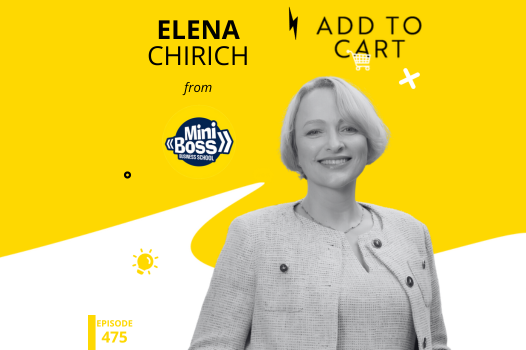In this week’s episode of Add to Cart, we’re joined by Elena Chirich, the driving force behind MiniBoss Business School’s Australian arm. After a successful career leading transformational projects for global giants like Virgin, KPMG and Deloitte, Elena made a bold pivot to focus on empowering kids. MiniBoss Business school is a global education network spanning over 20 countries, equipping students as young as eight with real-world business skills. With 8 courses and 12 types of practice, Elena is developing creativity, resilience and mentorship and helping shape the next wave of fearless entrepreneurs.
With branches in Brisbane, Melbourne and, as of this year, Sydney, the Miniboss School is catapulting lots of young Australian entrepreneurs into the spotlight, as they learn about world famous ventures, and start up their own innovative brands, such as Canine Cakes and Scam Busters.
Fostering Creativity Early
Elena emphasised that creativity isn’t just an innate skill—it’s a muscle that needs regular exercise. Creativity is a resource that diminishes if left untended, especially as we grow older and societal expectations start to narrow our thinking.
“At the age of five, every child tests at the genius level for creativity. But every five years after that, it halves unless we actively develop it.”
At MiniBoss, creativity is prioritised through brainstorming sessions and innovative problem-solving activities tailored for young minds. Students are encouraged to approach challenges with a no-limits mindset.
The ideas kids come up with are often so unexpected and bold—they’re not constrained by the mental patterns we adults get stuck in.
For example, students might be tasked with developing a product or service, starting with out-of-the-box ideas before narrowing down to something actionable. It’s a process that not only fosters imagination but also builds confidence in their unique perspectives.
For adults, there’s a clear lesson here: we, too, need to nurture our creativity. Whether it’s breaking out of daily routines, collaborating with people from outside your industry, or hosting brainstorming sessions with no “bad ideas” allowed, shaking up mental patterns can help unlock fresh, innovative solutions. It’s not about forcing creativity—it’s about creating the conditions for it to thrive.
Building Resilience Through Experience
One of MiniBoss’s most distinctive features is its hands-on approach to teaching entrepreneurship. Students don’t just learn theories—they’re given the opportunity to start and manage their own small businesses. This practical exposure helps them experience the realities of entrepreneurship, from the excitement of launching to the challenges of failure.
A standout example is Brody, a 12-year-old MiniBoss student from Perth who founded UltraZips, a brand of inclusive swimwear featuring easy-on zippers. Initially, Brody struggled with shyness.Over time, however, he gained confidence through experience. Now, he’s managing his own market stall, giving media interviews, and even selling his products in pharmacies.
At MiniBoss, failure is framed as a valuable learning opportunity rather than a setback. Students are encouraged to experiment, take risks, and learn from their mistakes.
The earlier kids face failure and realise it’s not the end of the world, the stronger they’ll be.
This mindset applies to all of us. Whether you’re launching a new product or entering a new market, failures can feel daunting. But as Elena pointed out, they’re often a stepping stone to growth. Learning to view challenges as part of the journey can make us more resilient and open to taking the risks necessary for innovation.
Learning From Real Mentors
Elena believes that mentorship is one of the most effective tools for learning and growth. At MiniBoss, students are paired with seasoned entrepreneurs and industry experts who share insights that no textbook could replicate.
MiniBoss has connected students with mentors like Simon Beard, the founder of Culture Kings, and Mark Thompson, the former CEO of Nude by Nature. These mentors offer invaluable advice, tailored to the students’ unique business ideas. For example, Elena shared a story about a MiniBoss student who wanted to launch a skincare line.
“Mark Thompson [explained] the importance of starting with a hero product. It’s about finding that one standout product that defines your brand before expanding your range.”
Another example involved a student passionate about drones. Through MiniBoss, they were mentored by the founder of Australia’s leading drone company, who helped the student understand that success in drones isn’t just about technology—it’s about capturing stunning footage, showcasing what the drones can do.
Elena sees mentorship as a game-changer not just for kids, but for professionals as well. Whether you’re just starting out or are a seasoned entrepreneur, learning from those with firsthand experience can provide clarity, direction, and inspiration.
“Surround yourself with people who have been there before—they can help you avoid mistakes and fast-track your success.”
Cultivating Lifelong Entrepreneurial Mindsets
Elena’s work highlights a powerful truth. The skills that make us successful—creativity, resilience, and learning from others—aren’t just for kids, they’re universal and timeless. Whether you’re nurturing the next generation of leaders or looking to expand your own horizons, the path to success is always underpinned by a willingness to think differently, take risks and learn from the people and experiences around us.





